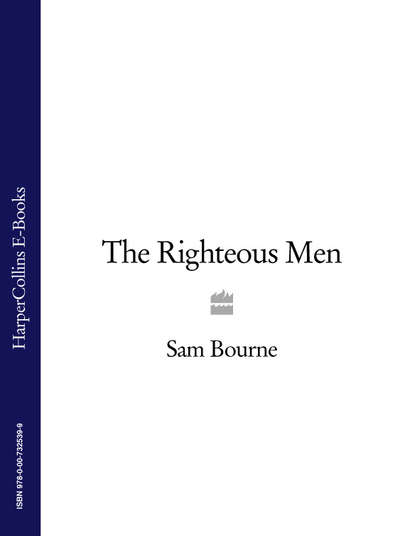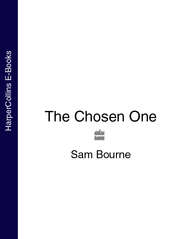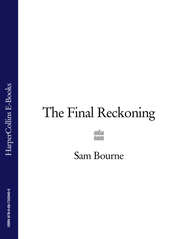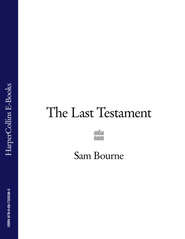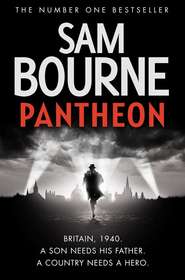По всем вопросам обращайтесь на: info@litportal.ru
(©) 2003-2024.
✖
The Righteous Men
Автор
Год написания книги
2018
Настройки чтения
Размер шрифта
Высота строк
Поля
He looked at the email again, his heart shrinking as he saw those words. He tried to focus, to look at the top of the message, among those strange, garbled characters. There were some numbers, today's date and a timestamp which said 1.37pm, even though that was several hours away. That gave no clue.
Of course, he should call the police. But these people, these bastards, seemed so adamant – as if they really would not hesitate to kill Beth. Uttering the word, even if only as a thought in his own head, made him recoil. He regretted formulating the idea, as if expressing it made it real. He wished he could take it back.
In a moment of childish need, he realized he wanted his mother. He could call her – it would only be mid-afternoon in England now – and it would be such a comfort to hear her voice. But he knew he would not. She would panic; she might have an anxiety attack. She certainly could not be trusted not to phone the police, or at least talk to someone who would talk to someone who would. The simple truth was, she was too far away for him to manage and his mother was a person who needed managing. (He realized that word was a Beth-ism. It made sense that she was one of the very few people who knew how to handle Will's mother.)
He was slowly beginning to see that there was only one person he could ask, only one person who might know what to do. His hand shook as he reached for the hotel phone, something telling him this was not a call to be made on a cell.
‘The office of Judge William Monroe, please.’ A click. ‘Janine, it's Will. I need to speak to my father right away.’ Something in his voice cut through all social convention, conveying to his father's secretary that this was indeed an emergency. She dispensed with her usual small talk. She simply cleared out of the way, like a car making room for an ambulance. ‘I'll patch you through to his car now.’ A cell phone, thought Will, worriedly. He would have to let it pass: more important now just to get through.
It was a relief to hear his father pick up. The child in him felt glad, like a boy who persuades his dad to come kill a spider. Good, now an adult was going to take over. Doing his best to hold his voice steady, he told his father what had happened, reading the email out slowly, twice.
Monroe Sr's voice instantly dipped; he did not want to be overheard by his driver. Even in a whisper his voice had the deep authority that made him such a presence on the bench. Now, as he would in court, he asked all the pertinent questions, pressing his son to tell him everything he could work out about the sender. Finally, he delivered his ruling.
‘It's obviously an attempt at extortion. They must know about Beth's parents. It's a classic ransom demand.’
Beth's parents. He would have to tell them. How would he even utter the words? ‘I want to call the police,’ said Will. ‘They know how to handle these things.’
‘No, we mustn't do anything too rash. My understanding is that kidnappers usually assume the victim's family will go to the police: they factor it into their planning. There must be a reason why these people are so determined to avoid the police being involved.’
‘Of course they don't want the police to be involved! They're fucking kidnappers, Dad!’
‘Will, calm down.’
‘How can I calm down?’ Will could feel his voice about to break. His eyes were stinging. He did not dare try speaking again.
‘Oh, Will. Listen, we're going to get through this, I promise. First, you need to get back here. Immediately. Go to the airport right away. I'll meet you off the flight.’
Those five hours in the air were the hardest of Will's life. He stared out of the window, his leg oscillating in a nervous tic that used to strike him during exams. He refused all food and drink, until he noticed the cabin attendants were eyeing him suspiciously. He did not want them thinking he was poised to blow up the plane, so he sipped some water. And all the time he was imagining his beloved Beth. What were they doing to her? He began to picture her tied to a chair, while some sadist dangled a knife—
It took all his strength to stop such thoughts before they had picked up speed. His guts were turning over. How could I not have been there? If only I had phoned earlier. Maybe she called the cell phone when I was asleep …
Throughout he held the BlackBerry in the palm of his hand. He hated everything about this accursed machine. Even to glance at it brought those chilling words right back. He could see them now, hovering in the air in front of him:
INVOLVE THE POLICE AND YOU WILL LOSE HER.
He looked at the device, so small yet now containing so much poison. It was sleeping: no signal at this height. He kept watching the icon at the top right that would tell him when it was back within range. As the plane began its descent, he stole peeks at it. He did not want the flight attendants reminding him that they had asked that all ‘electronic devices be turned off until the aircraft has come to a complete stop’.
At last he could see the sparkle of New York City in mid-afternoon. She's down there. The bridges, the highways, the flickering necklaces of light criss-crossing the whole vast metropolis. She's there somewhere.
He glanced down at the BlackBerry, moist with his own palm-sweat. The icon had changed; it was back in range. Now the red light was flashing. Will's heart began to pound. He looked at the new messages flowing in, each one taking its place like passengers in a bus queue. Some round-robin cinema listing; an internal message from work about a lost notebook. There was a news-alert from the BBC website.
Tributes have been pouring in for the Chancellor of the Exchequer, Gavin Curtis, found dead this evening, apparently from a drugs overdose. Police say he was found by a cleaner in his Westminster flat, with an excess of a sedative drug in his bloodstream. It's believed that the police are not looking for anyone else in connection with Mr Curtis's death …
Will was staring out of the window, just imagining the media frenzy back in London. He had grown up there: he knew what the British press was like when its blood was up. They had been gunning for this guy for days and now they had got their scalp. Will could not remember the last time a politician had actually topped himself: when it came to taking responsibility, resignation was usually as far as they would go, and even that had become pretty rare. This Curtis must have been guilty as hell.
And then one more message popped into the BlackBerry: the same hieroglyphic string that refused to reveal itself. Subject: Beth.
Will clicked it open.
WE DO NOT WANT MONEY.
CHAPTER THIRTEEN (#ulink_e039f87a-5f69-5b22-869e-0d396db6e607)
Friday, 2.14pm, Brooklyn ‘It must be a bluff.’
‘Dad, you've said that three times. Tell me, what do you think we should do? Should we offer them money anyway? What should we fucking do?’
‘Will, I don't blame you at all, but you must calm down. If we're to get Beth back we need to think as clearly as we can.’
That ‘if’ stopped Will short.
They were in Will and Beth's apartment. There was no sign of a break-in; everything was how he had last seen it. Except now a chill seemed to be coming off the walls and ceilings: the absence of Beth.
‘Let's think through what we know. We know that their first priority is that the police not be involved: they said it in their very first message. We also know that they say it's not about money. But if this is not about ransom, why else would they care so much about keeping the police out of it? They must be bluffing. Let's think about your email address. Who has it?’
‘Everyone has it! It's the same pattern for the whole Times staff. Anyone could work it out.’
A phone rang; Will pounced on his, frantically pressing buttons, but the sound kept coming. Calmly, his father answered his own phone. Nothing to do with this, he mouthed silently, disappearing into another room for a hushed conversation.
His father was proving no help. The aid he was offering was defiantly of the masculine variety, practical rather than emotional, and even that was not getting anywhere. Suddenly Will realized how much he missed his mother. Ever since he had been with Beth, that sentiment had become rarer and rarer: his wife was his confidante now. But, for a long while, that role had belonged to his mother.
In England, they had been a team, united by what he suddenly thought of as their loneliness. In his mother's version of the story, at least, she and Will had been abandoned by his father, leaving the two of them to fend for themselves. He knew there were alternative accounts, not that his father was in too much of a hurry to share his. The fate of his parents' marriage was a long-running puzzle to Will Monroe. He was never completely sure what happened.
One version said Monroe Sr had chosen his career over his family: over-work broke the young marriage. Another theory cited geography: wife was desperate to return to England, husband was determined to advance through the US legal system and refused to leave America. Will's maternal grandmother, a silver-haired Hampshire lady with a severe expression that frightened the young boy the first time he saw her, and for years afterwards, once spoke darkly of ‘the other great passion’ in his father's life. When he was old enough to inquire further, his grandmother shrugged it off. To this day, he did not know if that ‘great passion’ was another woman or the law.
Will's own memories offered little help; he was barely seven years old when his parents began to come apart. He remembered the atmosphere, the gloom that would descend after his father had stormed out, slamming the door. Or the shock of finding his mother, red-faced and hoarse after another fierce round of shouting. He once woke up from sleep to hear his father pleading, ‘I just want to do what's right.’ Will had tiptoed out of bed to find a place where he could watch his parents unseen. He could not understand the words they were saying but he could feel their force. It was at that moment, hearing his British mother and American father at full volume, that the seven year old boy developed a theory: his mummy and daddy could not love each other because they had different voices.
Once they were back in England, his mother gave few clues as to what had brought them there. Even raising the topic carried the risk of turning her into a bitter, ranting woman he hardly recognized and did not like. She would mutter about how her husband became ‘a different man, utterly different’. Will remembered one Christmas, his mother speaking in a way which frightened him; he could not have been much older than thirteen. The detail had faded now, but one word still leapt out. It was all ‘his’ fault, she kept saying; ‘he’ had changed everything. The intonation made clear that this ‘he’ was a third party, not his father, but Will could never figure out who it was. His mother was coming off like a paranoid, raving in the streets. Will was relieved when the storm passed and he was not brave enough to mention it again.
Friends, and his grandmother for that matter, were quick to analyse Will's return to the United States after Oxford as a response to all this. He was ‘choosing’ his father over his mother, said some. He was trying to reconcile the two, in the manner of many children of divorce, with himself as the bridge; that was another pet explanation. If he subscribed to any theory, which he did not, it would have been the journalistic one: that Will Monroe Jr went to America to get to the truth of the story that had shaped his early life.
But if that had been the purpose of his American journey, he had failed. He knew little more now than he did when he first arrived, aged twenty-two. He knew his father better, that was true. He respected him; he was a hugely accomplished lawyer, now a judge, and seemed an essentially decent man. But as to the big mystery, Will had gained no great insights. They had talked about the divorce, of course, during a couple of moonlit evenings on the veranda of his father's summer house at Sag Harbor. But there had been no flash of revelation.
‘Maybe that is the revelation,’ Beth had said one night when he came back inside after one of these father-to-son chats. They were spending a long Labor Day weekend with Will's father and his ‘partner’, Linda. Beth was lying on the bed, reading, waiting for Will to come back in.
‘What is?’
‘That there is no big mystery. That's the revelation. They were two people whose marriage didn't work. It happens. It happens a lot. That's all there is.’
‘But what about all that stuff my mother says? And that grandma used to say?’
‘Maybe they needed to have some grand explanation. Maybe it helped to think that some other woman stole him—’
‘Not necessarily another woman,’ Will muttered. ‘“The other great passion” was the phrase. Could have been anything.’
‘OK. My point is, I can see why a rejected wife and her very loving mother would need to invent a larger explanation for the departure of a husband. Otherwise it's a rejection, isn't it?’
She had not been his wife then, just the girlfriend he had met in his closing weeks at Columbia. He was in journalism school; she was doing a medical internship at the New York Presbyterian Hospital; they had met at a Memorial Day weekend softball game in the park. (He had left the message on her answering machine that same evening.) Those first few months were bathed in his mind in a permanent golden glow. He knew the memory could play tricks like that, but he was convinced the glow was a genuine, externally verifiable phenomenon. They had met in May, when New York was in the midst of a glorious spring. The days seemed to be lit by amber; each walk they took sparkled in the sun. It was not just their lovestruck imaginations; they had photographs to prove it.





